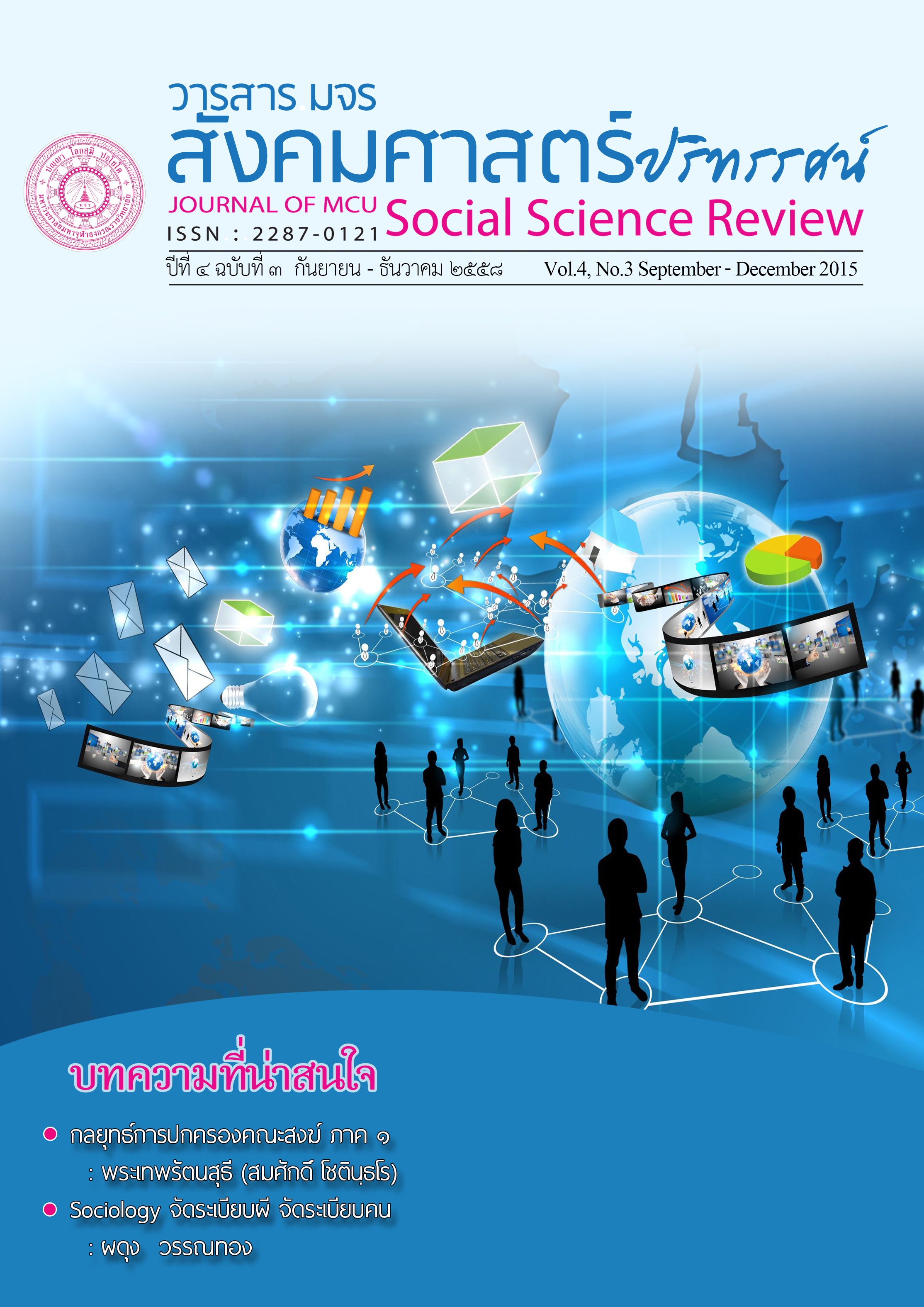การพัฒนาการจัดการการศาสนศึกษาแผนกธรรมของคณะสงฆ์ภาค ๑
คำสำคัญ:
การพัฒนา, การจัดการ, ศาสนศึกษา, แผนกธรรมบทคัดย่อ
การวิจัยครั้งนี้ มีวัตถุประสงค์ คือ ๑) เพื่อศึกษาแนวคิด ทฤษฎีที่เกี่ยวกับการพัฒนาการจัดการการศาสนศึกษาแผนกธรรม ๒) เพื่อศึกษาสภาพทั่วไปเกี่ยวกับการพัฒนาการจัดการการศาสนศึกษาแผนกธรรมของคณะสงฆ์ภาค ๑ และ๓) เพื่อเสนอแนวทางการพัฒนาการจัดการการศาสนศึกษาแผนกธรรมคณะสงฆ์ภาค ๑ ใช้ระเบียบวิธีวิจัยเชิงคุณภาพ (Qualitative Research) เก็บรวบรวมข้อมูลจากเอกสารและงานวิจัยที่เกี่ยวข้องและจากผู้ให้ข้อมูลหลัก (Key Informants) จำนวน ๑๘ รูป/คน โดยสัมภาษณ์เจาะลึก (In-depth interview) และการสนทนากลุ่มเฉพาะ (Focus Group Discussion) จำนวน ๘ รูป/คน โดยวิเคราะห์ข้อมูลใช้วิธีการวิเคราะห์เนื้อหาเชิงพรรณนาความ
ผลการวิจัย พบว่า
๑. แนวคิด ทฤษฎีที่เกี่ยวกับการพัฒนา มีกระบวนพัฒนาการจัดการศาสนศึกษาโดยนำแผนงานเชิงกลยุทธ์เข้ามาทำการวิเคราะห์สถานการณ์ซึ่งประกอบด้วยการวิเคราะห์ SWOT Analysis ประกอบด้วย ๔ อย่าง คือ จุดแข็ง จุดอ่อน โอกาสและปัญหามาดำเนินการวิเคราะห์แนวคิดทฤษฎีทั้ง ๕ ด้าน ได้แก่ ด้านหลักสูตร ด้านครูผู้สอน ด้านกระบวนการเรียนการสอน ด้านสื่ออุปกรณ์การสอน ด้านการวัดผลและประเมินผล
๒. สภาพทั่วไปเกี่ยวกับการพัฒนาการจัดการศาสนศึกษาแผนกธรรมของคณะสงฆ์ภาค ๑ พบว่า พระสังฆาธิการในทุกระดับชั้นให้ความร่วมมือกันดี มีกลไกในการพัฒนาและบริหารหลักสูตรให้มีประสิทธิภาพ โน้มน้าวผู้เรียนให้เข้าถึงจุดมุ่งหมายของหลักสูตรอย่างแท้จริง ทำให้มีครูที่มีศักยภาพ มีความเชี่ยวชาญเฉพาะตัว และมีปริมาณอย่างเพียงพอต่อการเรียนการสอน เพราะอยู่ในศูนย์กลางทางการศึกษา ปฏิรูปเทศดีกว่าต่างจังหวัด โดยมีกระบวนการเรียนการสอน ที่มีการจัดทำแผนการสอนตามแผนยุทธศาสตร์ มีเทคนิควิธีที่สามารถสอนให้จูงใจ แจ่มแจ้ง แกล้วกล้าให้บุคลากรผลิตสื่อที่มีคุณภาพ แล้วนำสื่อไปปรับใช้เพื่อให้เกิดศักยภาพทางการเรียนรู้เพิ่มขึ้น และส่งผลให้คณะสงฆ์มีการวางแผนในการตรวจสอบการสอบวัดผลประจำปีที่รัดกุมและจริงจังต่อการกำกับดูแล
๓) แนวทางการพัฒนาการจัดการการศาสนศึกษาแผนกธรรมคณะสงฆ์ภาค ๑ พบว่า ๑) ด้านหลักสูตร ควรมีการพัฒนาให้ทันสมัยและสอดคล้องกับสายสามัญ ๒) ด้านครูผู้สอน ต้องเป็นครูมืออาชีพ มีการศึกษา อบรมและพัฒนาตัวเองตลอดเวลา ๓) ด้านกระบวนการเรียนการสอน ที่มีคุณภาพ และควรปรับระยะเวลาการสอนให้เพิ่มมากขึ้น ๔) ด้านสื่ออุปกรณ์การสอน ควรนำเทคโนโลยีการเรียนการสอนที่ทันสมัยมาประยุกต์ให้ผู้เรียนเกิดทักษะในการนำไปใช้ ๕) ด้านการวัดผลและประเมินผล ต้องมีรูปแบบเป็นมาตรฐานเดียวกันทั้งประเทศเพื่อให้เกิดผลที่ชัดเจน
เอกสารอ้างอิง
(๑) หนังสือ :
จิรประภา อัครบวร. คุณค่าคน คุณค่างาน. กรุงเทพมหานคร : สำนักพิมพ์เต๋า ๒๐๐๐, ๒๕๕๒.
พยอม วงศ์สารศรี. การบริหารทรัพยากรมนุษย์. กรุงเทพมหานคร : คณะวิทยาการจัดการมหาวิทยาลัยราชภัฏสวนดุสิต, ๒๕๕๐.
พระไพศาล วิสาโล, พุทธศาสนาไทยในอนาคต แนวโน้มและทางออกจากวิกฤต. กรุงเทพมหานคร : มูลนิธิสดศรี-สฤษดิ์วงศ์, ๒๕๔๖.
พระธรรมโกศาจารย์ (ประยูร ธมฺมจิตฺโต). พุทธวิธีการบริหาร. กรุงเทพมหานคร : โรงพิมพ์มหาจุฬาลงกรณราชวิทยาลัย, ๒๕๕๑.
พระธรรมปัญญาภรณ์ (สุชาติ ธมฺมรตโน) และ พระมหาทองดี ปญฺาวชิโร. การศึกษาพระปริยัติธรรม แผนกบาลี. กรุงเทพมหานคร: อาทรการพิมพ์, ๒๕๔๘.
ศิริวรรณ เสรีรัตน์. ทฤษฎีองค์การ : ฉบับมาตรฐาน. กรุงเทพมหานคร: ธรรมสาร, ๒๕๕๓.
สำนักงานแม่กองธรรมสนามหลวง. เรื่องสอบธรรมสนามหลวงแผนกธรรม พ.ศ. ๒๕๔๔. กรุงเทพมหานคร: โรงพิมพ์การศาสนา, ๒๕๔๔.
สุนันทา เลาหนันท์. การพัฒนาองค์การ. กรุงเทพมหานคร: ซีวีแอลการพิมพ์, ๒๕๕๓.
(๒) วิทยานิพนธ์/งานวิจัย
นงลักษณ์ เรือนทอง. “รูปแบบการบริหารโรงเรียนที่มีประสิทธิผล”. ปริญญาปรัชญาดุษฎีบัณฑิต (สาขาวิชาการบริหารการศึกษา). บัณฑิตวิทยาลัย: มหาวิทยาลัยศิลปกร, ๒๕๕๐.
บัณฑิต ฉัตรวิโรจน์. “การพัฒนารูปแบบการจัดการเรียนการสอนแบบการจัดความรู้เพื่อเสริมสร้างสมรรถนะการสอนของนักศึกษาครู”. ปริญญาครุศาสตรดุษฎีบัณฑิต (สาขาวิชาอุดมศึกษา). บัณฑิตวิทยาลัย : จุฬาลงกรณ์มหาวิทยาลัย, ๒๕๕๐.
สมศักดิ์ บุญปู่,ผศ.ดร. “การพัฒนาการศึกษาสงฆ์”. สารนิพนธ์พุทธศาสตรบัณฑิต. กรุงเทพมหานคร: นวสารน์การพิมพ์, ๒๕๕๒.
พระมหาสหัส ตสาโร. “การบริหารองค์กรคณะสงฆ์”. รายงานการวิจัย. พระนครศรีอยุธยา : มหาจุฬาลงกรณราชวิทยาลัย, ๒๕๕๑.
พระราชรัตนมงคล (มนตรี ยางธิสาร). “การพัฒนาหลักสูตรฝึกอบรมวิธีการสอนศีลธรรมระดับมัธยมศึกษาตอนต้นของพระสอนศีลธรรมตางโครงการของกระทรวงศึกษาธิการ”. ปริญญาการศึกษาดุษฎีบัณฑิต (สาขาวิชาการศึกษาผู้ใหญ่). บัณฑิตวิทยาลัย: มหาวิทยาลัยศรีนครินทรวิโรฒ, ๒๕๕๔.
สมชาย ไมตรี. “การศึกษาของพระสงฆ์ในประเทศไทย : กรณีศึกษาพระปริยัติธรรมแผนกบาลี”. งานวิจัยค้นคว้าอิสระ. กรุงเทพมหานคร: สำนักงานคณะกรรมการการวิจัยแห่งชาติ, ๒๕๓๙.
(๓) เอกสารที่ไม่ได้ตีพิมพ์:
นภัทร์ แก้วนาค, “เอกสารประกอบการสอน เรื่อง เทคนิคการวิเคราะห์ข้อมูลเชิงคุณภาพ Qualitative Data Analysis Technique”. ถ่ายเอกสารเย็บเล่ม.
๒. ภาษาอังกฤษ
(I) Book
Fred Luthens. Organization Behavior. Singapore : McGraw-Hill International Editions, 1995.
ดาวน์โหลด
เผยแพร่แล้ว
รูปแบบการอ้างอิง
ฉบับ
ประเภทบทความ
สัญญาอนุญาต
ลิขสิทธิ์ (c) 2018 วารสาร มจร สังคมศาสตร์ปริทรรศน์

อนุญาตภายใต้เงื่อนไข Creative Commons Attribution-NonCommercial-NoDerivatives 4.0 International License.
เพื่อให้เป็นไปตามกฎหมายลิขสิทธิ์ ผู้นิพนธ์ทุกท่านต้องลงลายมือชื่อในแบบฟอร์มใบมอบลิขสิทธิ์บทความให้แก่วารสารฯ พร้อมกับบทความต้นฉบับที่ได้แก้ไขครั้งสุดท้าย นอกจากนี้ ผู้นิพนธ์ทุกท่านต้องยืนยันว่าบทความต้นฉบับที่ส่งมาตีพิมพ์นั้น ได้ส่งมาตีพิมพ์เฉพาะในวารสาร มจร สังคมศาสตร์ปริทรรศน์ เพียงแห่งเดียวเท่านั้น หากมีการใช้ภาพหรือตารางหรือเนื้อหาอื่นๆ ของผู้นิพนธ์อื่นที่ปรากฏในสิ่งตีพิมพ์อื่นมาแล้ว ผู้นิพนธ์ต้องขออนุญาตเจ้าของลิขสิทธิ์ก่อน พร้อมทั้งแสดงหนังสือที่ได้รับการยินยอมต่อบรรณาธิการ ก่อนที่บทความจะได้รับการตีพิมพ์ หากไม่เป็นไปตามข้อกำหนดเบื้องต้น ทางวารสารจะถอดบทความของท่านออกโดยไม่มีข้อยกเว้นใดๆ ทั้งสิ้น





